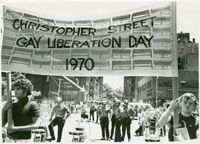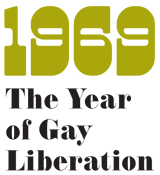Christopher Street Liberation Day 1970
 |
"Marching
Any Ol' Way We Damn Well Please"
Two men (Jim Fouratt at right) holding Christopher Street
Liberation Day banner, 1970. Photograph by Diana Davies.
NYPL, Manuscripts and Archives Division, Diana Davies Papers. Copyright Diana
Davies.
Digital ID: 1619938 |
In 1965 the East Coast Homophile Organization (ECHO) began holding
annual Reminder Marches in Philadelphia each Fourth of July. To
commemorate the first anniversary of the Stonewall Riots, ECHO
approved moving the 1970 march to New York City for the last weekend
in June. Craig Rodwell was the major force behind the move. A
veteran activist of Mattachine, Rodwell had started the Oscar
Wilde Memorial Bookshop in 1967 in order to create a visible public
space for gays and lesbians, and had participated in Mattachine's "sip-in" at
Julius' bar protesting the State Liquor Authority's ban on serving
homosexuals. After organizing the New York involvement in the
annual Reminder Marches for several years, Rodwell spearheaded
the committee to plan the new march in New York City. The new
march was called the Christopher Street Liberation Day March to
move attention from the Mafia-controlled Stonewall and onto the
gay and lesbian struggle for liberation happening in the streets.
Despite widespread fear of police obstruction and public violence,
the march went on, traveling uptown on Sixth Avenue from Greenwich
Village to Central Park for the "Gay Be-In." All of
the New York City gay and lesbian groups participated — both
the new generation and established veterans — as well as
visitors, and the march attracted national media attention. The
more than 2,000 people who joined in transformed American public
discussion of homosexuality that day, simply by being themselves
as they walked together uptown. A sister march was held in Los
Angeles, and soon, sister marches would be held around the world.

